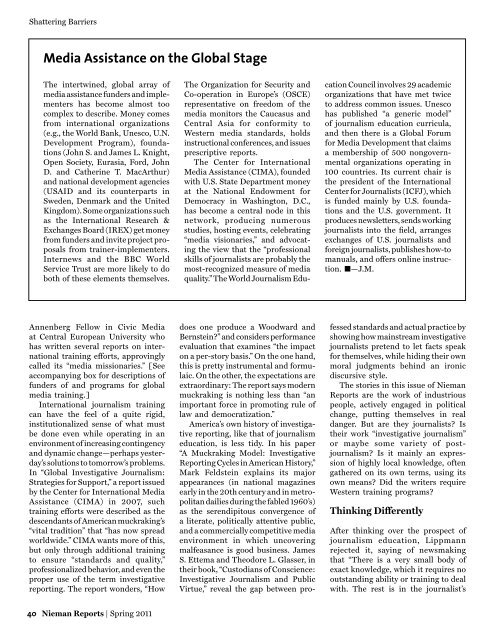N ieman Reports - Nieman Foundation - Harvard University
N ieman Reports - Nieman Foundation - Harvard University
N ieman Reports - Nieman Foundation - Harvard University
You also want an ePaper? Increase the reach of your titles
YUMPU automatically turns print PDFs into web optimized ePapers that Google loves.
Shattering Barriers<br />
Media Assistance on the Global Stage<br />
The intertwined, global array of<br />
media assistance funders and implementers<br />
has become almost too<br />
complex to describe. Money comes<br />
from international organizations<br />
(e.g., the World Bank, Unesco, U.N.<br />
Development Program), foundations<br />
(John S. and James L. Knight,<br />
Open Society, Eurasia, Ford, John<br />
D. and Catherine T. MacArthur)<br />
and national development agencies<br />
(USAID and its counterparts in<br />
Sweden, Denmark and the United<br />
Kingdom). Some organizations such<br />
as the International Research &<br />
Exchanges Board (IREX) get money<br />
from funders and invite project proposals<br />
from trainer-implementers.<br />
Internews and the BBC World<br />
Service Trust are more likely to do<br />
both of these elements themselves.<br />
The Organization for Security and<br />
Co-operation in Europe’s (OSCE)<br />
representative on freedom of the<br />
media monitors the Caucasus and<br />
Central Asia for conformity to<br />
Western media standards, holds<br />
instructional conferences, and issues<br />
prescriptive reports.<br />
The Center for International<br />
Media Assistance (CIMA), founded<br />
with U.S. State Department money<br />
at the National Endowment for<br />
Democracy in Washington, D.C.,<br />
has become a central node in this<br />
network, producing numerous<br />
studies, hosting events, celebrating<br />
“media visionaries,” and advocating<br />
the view that the “professional<br />
skills of journalists are probably the<br />
most-recognized measure of media<br />
quality.” The World Journalism Education<br />
Council involves 29 academic<br />
organizations that have met twice<br />
to address common issues. Unesco<br />
has published “a generic model”<br />
of journalism education curricula,<br />
and then there is a Global Forum<br />
for Media Development that claims<br />
a membership of 500 nongovernmental<br />
organizations operating in<br />
100 countries. Its current chair is<br />
the president of the International<br />
Center for Journalists (ICFJ), which<br />
is funded mainly by U.S. foundations<br />
and the U.S. government. It<br />
produces newsletters, sends working<br />
journalists into the field, arranges<br />
exchanges of U.S. journalists and<br />
foreign journalists, publishes how-to<br />
manuals, and offers online instruction.<br />
—J.M.<br />
Annenberg Fellow in Civic Media<br />
at Central European <strong>University</strong> who<br />
has written several reports on international<br />
training efforts, approvingly<br />
called its “media missionaries.” [See<br />
accompanying box for descriptions of<br />
funders of and programs for global<br />
media training.]<br />
International journalism training<br />
can have the feel of a quite rigid,<br />
institutionalized sense of what must<br />
be done even while operating in an<br />
environment of increasing contingency<br />
and dynamic change—perhaps yesterday’s<br />
solutions to tomorrow’s problems.<br />
In “Global Investigative Journalism:<br />
Strategies for Support,” a report issued<br />
by the Center for International Media<br />
Assistance (CIMA) in 2007, such<br />
training efforts were described as the<br />
descendants of American muckraking’s<br />
“vital tradition” that “has now spread<br />
worldwide.” CIMA wants more of this,<br />
but only through additional training<br />
to ensure “standards and quality,”<br />
professionalized behavior, and even the<br />
proper use of the term investigative<br />
reporting. The report wonders, “How<br />
does one produce a Woodward and<br />
Bernstein?” and considers performance<br />
evaluation that examines “the impact<br />
on a per-story basis.” On the one hand,<br />
this is pretty instrumental and formulaic.<br />
On the other, the expectations are<br />
extraordinary: The report says modern<br />
muckraking is nothing less than “an<br />
important force in promoting rule of<br />
law and democratization.”<br />
America’s own history of investigative<br />
reporting, like that of journalism<br />
education, is less tidy. In his paper<br />
“A Muckraking Model: Investigative<br />
Reporting Cycles in American History,”<br />
Mark Feldstein explains its major<br />
appearances (in national magazines<br />
early in the 20th century and in metropolitan<br />
dailies during the fabled 1960’s)<br />
as the serendipitous convergence of<br />
a literate, politically attentive public,<br />
and a commercially competitive media<br />
environment in which uncovering<br />
malfeasance is good business. James<br />
S. Ettema and Theodore L. Glasser, in<br />
their book, “Custodians of Conscience:<br />
Investigative Journalism and Public<br />
Virtue,” reveal the gap between professed<br />
standards and actual practice by<br />
showing how mainstream investigative<br />
journalists pretend to let facts speak<br />
for themselves, while hiding their own<br />
moral judgments behind an ironic<br />
discursive style.<br />
The stories in this issue of N<strong>ieman</strong><br />
<strong>Reports</strong> are the work of industrious<br />
people, actively engaged in political<br />
change, putting themselves in real<br />
danger. But are they journalists? Is<br />
their work “investigative journalism”<br />
or maybe some variety of postjournalism?<br />
Is it mainly an expression<br />
of highly local knowledge, often<br />
gathered on its own terms, using its<br />
own means? Did the writers require<br />
Western training programs?<br />
Thinking Differently<br />
After thinking over the prospect of<br />
journalism education, Lippmann<br />
rejected it, saying of newsmaking<br />
that “There is a very small body of<br />
exact knowledge, which it requires no<br />
outstanding ability or training to deal<br />
with. The rest is in the journalist’s<br />
40 N<strong>ieman</strong> <strong>Reports</strong> | Spring 2011

















